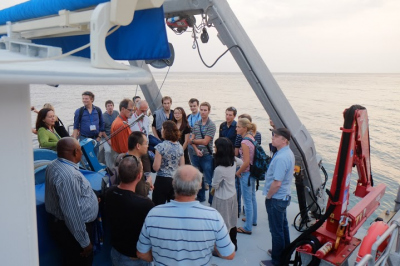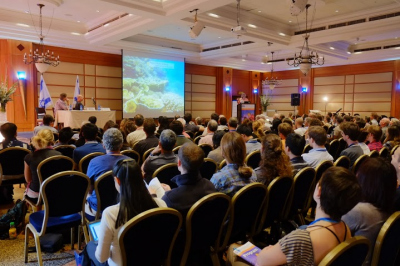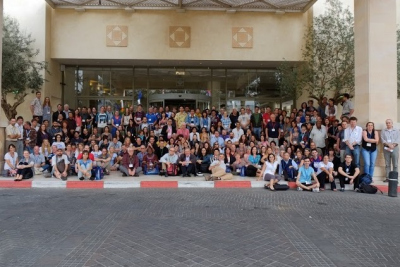Page path:
Ulisse Cardini
Report of GLOMAR PhD student Ulisse Cardini about his participation in the 8th International Conference on Coelenterate Biology in Eilat, Israel, 1 - 5 December 2013
The ICCB8 conference engaged with topics related to coelenterates including corals, sea anemones, hydroids, jellyfish and ctenophores. Presentations included classical as well as novel and cutting-edge topics ranging from the organism level to community and populations, as well as cellular and molecular levels. More than 250 researchers and students from around the world attended the meeting, comprising several leading scientists in the field of coral reef ecology. The ICCB8 held 15 different sessions, divided into three concurrent sections, all of which benefitted from the lively participants and fruitful discussions. The warm and sunny Eilat weather acted as a catalyst for the friendly and open atmosphere of the entire conference.
During the conference I particularly benefitted from the sessions “Physiology and Biomineralization”, “Symbiosis and Coevolution” and “Global Change” which all hosted very interesting oral presentations related both to my field of interest and to my PhD project. I presented a talk titled: “Assessing the Linkage of C and N2 fixation by Red Sea Hard Corals Holobionts” in the session “Symbiosis and Coevolution” after which I received interesting and inspiring comments from scientists from my field of research. The manuscript that I am preparing will most certainly benefit from this discussion.
I deeply enjoyed the conference, during which I had the chance to meet and interact with several international leading scientists. Furthermore, I got to know a researcher who is working in a group using a cutting-edge method which I would be delighted to use for my research. He was very interested in my topic and I am now considering if planning a research stay at his Institute to get some training and develop a collaboration.
Besides the pleasant social events offered during the conference, I had the opportunity of participating in a visit to the Underwater Observatory and the Interuniversity Institute for Marine Sciences (IUI). While the first is a simple although interesting aquarium, the IUI is a research station with facilities which allow research activities spanning the whole spectrum of marine sciences.
The research and teaching infrastructure at the IUI includes "wet" and "dry" laboratories, pools and tanks fed by sea water, a wide variety of instrumentation, diving services, small self-operated boats and a research vessel (about 24m) for deep sea work in the Gulf of Aqaba.
In general, participating in the ICCB8 allowed me to strengthen my scientific network, learn about new approaches and improve my own research. Special thanks to GLOMAR who supported my participation in the ICCB8.
During the conference I particularly benefitted from the sessions “Physiology and Biomineralization”, “Symbiosis and Coevolution” and “Global Change” which all hosted very interesting oral presentations related both to my field of interest and to my PhD project. I presented a talk titled: “Assessing the Linkage of C and N2 fixation by Red Sea Hard Corals Holobionts” in the session “Symbiosis and Coevolution” after which I received interesting and inspiring comments from scientists from my field of research. The manuscript that I am preparing will most certainly benefit from this discussion.
I deeply enjoyed the conference, during which I had the chance to meet and interact with several international leading scientists. Furthermore, I got to know a researcher who is working in a group using a cutting-edge method which I would be delighted to use for my research. He was very interested in my topic and I am now considering if planning a research stay at his Institute to get some training and develop a collaboration.
Besides the pleasant social events offered during the conference, I had the opportunity of participating in a visit to the Underwater Observatory and the Interuniversity Institute for Marine Sciences (IUI). While the first is a simple although interesting aquarium, the IUI is a research station with facilities which allow research activities spanning the whole spectrum of marine sciences.
The research and teaching infrastructure at the IUI includes "wet" and "dry" laboratories, pools and tanks fed by sea water, a wide variety of instrumentation, diving services, small self-operated boats and a research vessel (about 24m) for deep sea work in the Gulf of Aqaba.
In general, participating in the ICCB8 allowed me to strengthen my scientific network, learn about new approaches and improve my own research. Special thanks to GLOMAR who supported my participation in the ICCB8.





